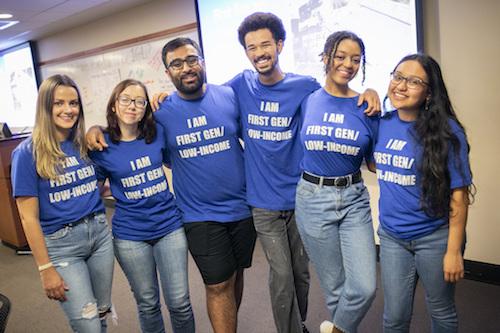
Featured Video
Terry Sanford Leadership Award Winner: Kaylee Brilhart
When she was in middle school, Kaylee Brilhart and her mother realized her best shot at a college education was attending a top-tier school, because of the potential of a generous financial aid package for students from low-income families.
When she got to Duke, Brilhart struggled with being a first-generation student from a low-income family, and then turned that struggle into advocacy for other such students.
In their nomination of Brilhart for the 2020 Terry Sanford Leadership Award, Deondra Rose, assistant professor of public policy, and Elise Goldwasser, Sanford’s director of undergraduate internships, called her “a behind the scenes leader who has championed first-generation, low-income students at Sanford and on campus.”
Named for the founder of the Sanford School of Public Policy, the award is presented annually to a graduating senior.

Brilhart grew up in Pineland, Florida, in a small island town with a Dairy Queen, a Winn-Dixie and about 400 people. Her high school guidance counselor tried to steer Brilhart toward community college when she said wanted to go to Princeton. She found another counselor.
During her freshman year at Duke, Brilhart joined a sorority and tried to fit in. But the differences between her background and her peers’ backgrounds became clear. She struggled with her sense of identity.
“I just pretended to be like everybody else,” she said.
Changing her mindset
During her sophomore year, she joined Duke LIFE, a student group for first-generation and/or low-income family students, 1G/LI for short. “I just showed up at every meeting and event,” she said.
That year, Brilhart also took a public policy class where she wrote about how universities should be accountable to these students.

She worked at the Durham Early School, a Methodist Quaker School. “It was a big contrast to my school. I realized in my education, I didn’t learn about discrimination or inequity,” she said.
Through Duke Engage, Brilhart spent the summer of 2018 in Charlotte at a Title 1 school. The school has been rezoned and she worked with the principal on plans to adapt to the change.
Her junior year, Brilhart switched her major from pre-med to public policy.
“After I did that, it finally all started making sense,” she said.
Learning about class and equity issues from her classes gave context to the issues she had been struggling with. People at Sanford, faculty and staff helped her find ways to weave it all together.
Surprising choice for an honors thesis
Professor Jay Pearson was her advisor for her honors thesis, “Understanding Class Stratification and Inequality Through the Greek Social System at Duke University.”
“In many ways, the thesis was the culmination of my experience here at Duke,” she said.
Being part of Greek life heightened her feeling of being out of place. Through her thesis research, she was able to better understand how the Greek social system reinforced the stratifications of social class, in both overt ways such as through rush and covert ways such as low-income students choosing not to participate.
“Kaylee’s undergraduate honors thesis examining how the Greek social system at an elite university is founded upon as well as perpetuates and reinforces socioeconomic class stratification is the single most impressive and insightful I have had the pleasure of advising,” said Pearson.
Internship Assistance
For her public policy internship, Brilhart told Elise Goldwasser that she was interested in criminal justice work.
“Elise right away remembered an alum who was a public defender in Charlotte,” Brilhart said. “Most students here have those types of connections through their families. Being a public policy major, through Elise, I had those connections too.”
She was the only undergraduate out of 18 interns in the public defender’s office. Since she didn’t have legal training, she spent a lot of time at the jail, talking to clients. It was then she decided she wanted to become a public defender and has been accepted to The George Washington University Law School in Washington, D.C.
Starting to speak out

Also in her junior year, Brilhart published a letter in The Duke Chronicle about being 1G/LI. She wrote about stressing over affording her textbooks and the social ramifications of being low-income at Duke.
Soon after that, the Sanford School hosted a dinner with Sanford 1G/LI students, faculty and staff. Brilhart worked with Professor Rose, Quinton Smith, Sanford’s diversity and inclusion fellow, and others at Sanford to organize the event. People shared their stories, including Sanford Dean Judith Kelley, who was also a 1G/LI college student.
“It was a great way to mark what we had done, and one of my favorite events at Duke,” said Brilhart.
Her senior year, Brilhart began organizing events for 1G/Li students with members of the Duke LIFE executive board.
Organizing 1G/LI Awareness at Duke
“I got the idea for the awareness week from the public policy paper I wrote my sophomore year, which included a community college that had a first-generation awareness day. That gave me the idea to organize a full week of awareness for 1G/LI students,” she said.The week included printing and distribution of 1G/LI T-shirts, a bridge-painting event, publishing and sharing flyers with the stories of 1G/LI people, and a special dinner for the 1GLi community at Duke. Seventy-five faculty and staff, drawn from every department at Duke, took part.
“The T-shirts were everywhere,” she said.
Duke has made a lot of changes in the resources for 1G/LI students, although Brilhart is quick to point out, these were not all from her efforts. A directory was created from her work identifying all the IG/LI faculty and staff during the awareness week. There is a new office of Duke LIFE within the Office of Underground Education, and a new Duke LIFE space on campus.
“Being at Duke has been some of the best times of my life, but also the most challenging. I hope, through these efforts, the struggles of being 1G/LI won’t be as big for generations of students to come.”
